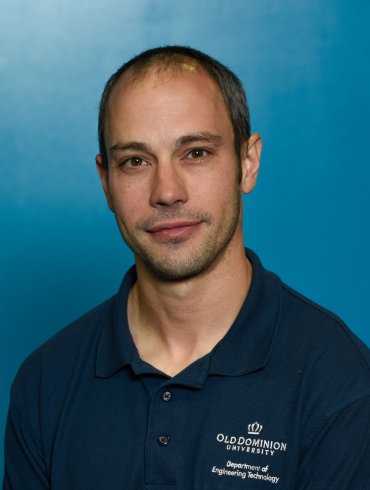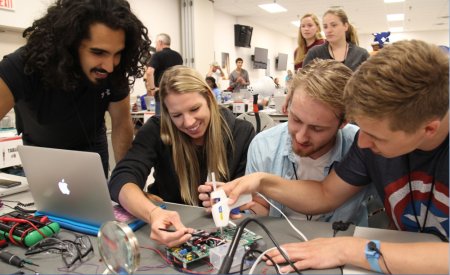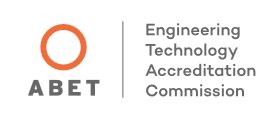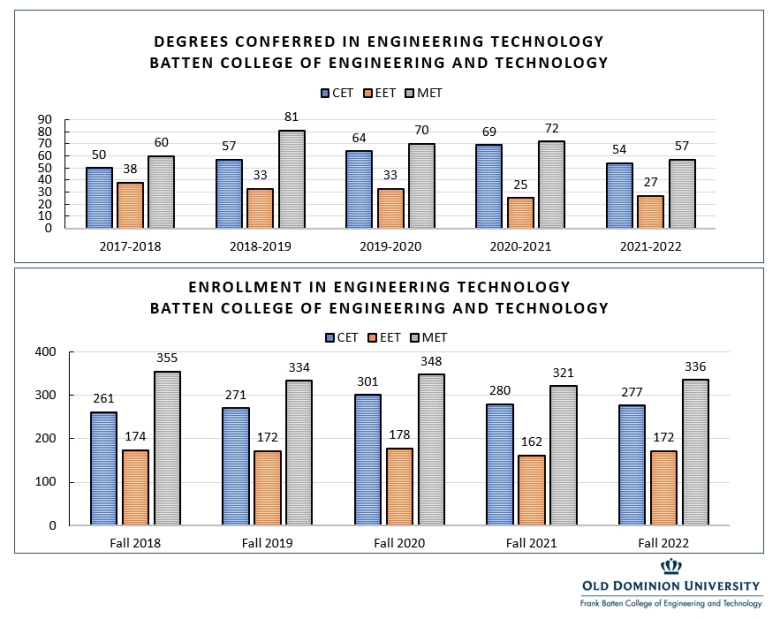The Mechanical Engineering Technology program is accredited by the Engineering Technology Accreditation Commission of ABET, and offers five areas of concentration: Manufacturing Systems, Marine Systems, Mechanical Systems Design, Mechatronics Systems, and Nuclear Systems.
Students in these concentrations take common courses in areas such as computer-aided drafting, statistics, strength of materials, dynamics, thermodynamics, fluid mechanics, automation and controls, and computer solid modeling.
The program culminates in a senior project that integrates course work with a practical project assignment in the student's area of interest.
To satisfy the upper-division general education requirements, students must complete a minor in Engineering or Science and select four senior electives.
Students in Mechanical Engineering Technology are prepared for a range of technical positions including system design, fabrication, manufacturing, HVAC (heating, ventilating and air conditioning), and mechatronics.
Concentrations
Along with the courses previously mentioned, various senior electives are available in the manufacturing areas such as robotics, computer integrated manufacturing in production, and advanced manufacturing processes. Graduates of the Manufacturing Systems Option are prepared for employment in a wide range of professional and technical positions at both large and small companies in areas such as manufacturing engineering, quality control, production management, test engineering, and maintenance management.
The Marine concentration provides the skills necessary for success working in the commercial or naval ship design field and includes exposure to basic ship characteristics, the unique aspects of ship design, familiarization with ship construction processes and techniques, various shipboard systems, basic shipboard operations and maintenance principles and philosophies.
The Mechanical System Design concentration provides the skills for career success in designing, building, and installing mechanical systems of all descriptions including thermal and air conditioning systems, automated production equipment, and power systems. Graduates of this option are prepared for careers in system design with engineering, fabrication, and technical support in both the public and private sectors in positions such as designer, engineer, CAD analyst, HVAC systems engineer and technical analyst.
The Mechatronics System concentration provides skills necessary for success working in mechatronic systems and includes robotics, mechatronics, CNC, mechanical subsystem design, computer integrated manufacturing, lean engineering and electrical power and machinery.
The Nuclear Engineering Technology concentration is a special program available only to graduates of the U. S. Navy Nuclear Power School and graduates of Nuclear Reactor Operator training at Dominion Energy. These students receive advanced standing credits that apply to the MET degree based on their professional education in nuclear power systems.
Mission Statement
The mission of the Mechanical Engineering Technology (MET) program is to sustain a high quality undergraduate program of study leading to the Bachelor of Science in Engineering Technology degree. It is a significant component of the University's commitment to science, engineering and technology, particularly in fields of major importance to the region. Through the University's distance learning program, the mechanical engineering technology program provides opportunities for technical personnel throughout the state and elsewhere to enhance their education and pursue baccalaureate level studies. Simultaneously, the program supports the general education components that yield a well-rounded graduate who is aware of societal needs and issues.
The objective of the mechanical engineering technology program is to prepare graduates to establish themselves as successful professionals in mechanical systems or related areas during the first few years of their careers by having demonstrated their ability to:
- Identify and solve increasingly complex technical problems, both theoretically and practically, as raised by continually evolving technologies and industry needs and practices.
- Make educated, responsible, and ethical decisions in response to the needs of the profession and society, with these decisions solidly grounded in science and engineering fundamentals.
- Work effectively as member or leader of technical teams and clearly communicate ideas leading to successful team outcomes
The mechanical engineering technology program has adopted, in agreement with its constituents, the following five student outcomes that each student should attain upon graduation:
- An ability to apply knowledge, techniques, skills, and modern tools of mathematics, science, engineering, and technology to solve broadly-defined engineering problems appropriate to the discipline
- An ability to design systems, components, or processes meeting specified needs for broadly-defined engineering problems appropriate to the discipline
- An ability to apply written, oral, and graphical communication in broadly-defined technical and non-technical environments; and an ability to identify and use appropriate technical literature
- An ability to conduct standard tests, measurements, and experiments and to analyze and interpret the results to improve processes
- An ability to function effectively as a member as well as a leader on technical teams
Message from the Program Director
The BS degree BSET program in Mechanical Engineering Technology offers a high quality degree program that meets national standards of excellence. It is a significant component of the University's commitment to science, engineering and technology, particularly in fields of major importance to the region. Through the University's Distance Learning program, the Mechanical Engineering Technology program provides opportunities for technical personnel throughout the state and elsewhere to enhance their education and pursue baccalaureate level studies. Simultaneously, the program supports the general education components that yield a well-rounded graduate who is aware of societal needs and issues.






